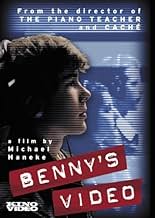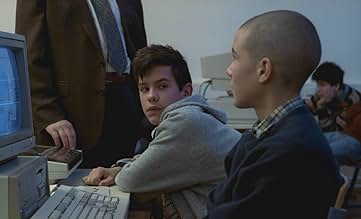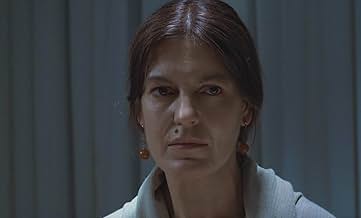VALUTAZIONE IMDb
7,1/10
19.845
LA TUA VALUTAZIONE
Un appassionato di video di quattordici anni non può più relazionarsi con il mondo reale.Un appassionato di video di quattordici anni non può più relazionarsi con il mondo reale.Un appassionato di video di quattordici anni non può più relazionarsi con il mondo reale.
- Regia
- Sceneggiatura
- Star
- Premi
- 2 vittorie e 3 candidature totali
Imelda Marcos
- Self
- (filmato d'archivio)
- (non citato nei titoli originali)
Hans Meiser
- Self
- (filmato d'archivio)
- (non citato nei titoli originali)
Brigitte Reimann
- Self
- (filmato d'archivio)
- (non citato nei titoli originali)
Martin Schoendeling
- Sales manager in videostore
- (non citato nei titoli originali)
Recensioni in evidenza
If it is supposed to be a Haneke film, it does have a couple of pitfalls. It is not Haneke's best, perhaps because maybe he felt the pressure to top Der Siebente Kontinent. As someone said previously, it is rather heavyweight towards the end.
As a film without regarding who directed it, it is very good. It provides you with a raw documentary vision of a boy and his voyeuristic trend towards violence. It is rather simple yet, an amazing idea. Benny could be the boy living next door and, in fact, he is. He is not frightning on a "I know what you did last Summer" fashion. He is _truly_ frightning because he is a normal kid. And I do know a few like him. The ones I know never actually murdered anyone but, perhaps they simply didn't do it because they are afraid. Benny hasn't come to terms with that moral feeling yet and perhaps he never will.
On a metaphorical sense, it is the best portrait (along with Der Siebente Kontinent) of present day Austria, at least the Austria I see at some September rainy Vienna weekends...
As a film without regarding who directed it, it is very good. It provides you with a raw documentary vision of a boy and his voyeuristic trend towards violence. It is rather simple yet, an amazing idea. Benny could be the boy living next door and, in fact, he is. He is not frightning on a "I know what you did last Summer" fashion. He is _truly_ frightning because he is a normal kid. And I do know a few like him. The ones I know never actually murdered anyone but, perhaps they simply didn't do it because they are afraid. Benny hasn't come to terms with that moral feeling yet and perhaps he never will.
On a metaphorical sense, it is the best portrait (along with Der Siebente Kontinent) of present day Austria, at least the Austria I see at some September rainy Vienna weekends...
In his second film of the "glaciation trilogy", Haneke once more hauntingly draws a torpid affluent society where the people live at cross purposes, where conservations are rare and toilsome, where communication is alienated to a technical process. Accordingly to that, the emotional life of the protagonists became stunted: Benny, after his "act", shows concernment only through surrogate actions, just like letting his hair cropped. The father immediately slyly pushes to damage mitigation, whereas only the mother indicates rudiments of emotion, though somehow tense. In a confusing blend of film and video images, Haneke creates a second level of reality, so to speak, where Benny's senseless "act" perfectly integrates in the horror pictures of the evening news and makes it open for question. At the same time, Haneke commits himself to no specific answer and denies any absolution. That is what makes this film so horrifying - there simply is no telling argument that makes a murderer out of a young boy.
From its opening sequence, the film immerses us in Benny's world, an adolescent who lives through the images he captures with his handycam and what he watches on television. These images, where reality, media, and fantasy blend without clear boundaries, shape his perception of the world: saturated with spectacles, chaotic, and lacking deep understanding.
The plot gradually reveals that this apparent visual chaos conceals something far darker and macabre. Benny receives an advanced video camera from his parents, a gift intended to compensate for the lack of affection in his upbringing. However, this present becomes a tool that allows him to emotionally isolate himself and create his own world through the lens, disconnecting even more from his family and social environment.
Haneke's cold, clinical style enhances this disconnection, with slow-paced direction that emphasizes unsettling details, like Benny's manipulation of recordings. This approach leads us to a profound examination of the influence of media on the perception of reality, the normalization of violence, and the emotional impact it has on the youth.
A key symbol in the narrative is the video of the pig's slaughter, recorded by Benny. This repeated act not only desensitizes him to violence but also reinforces the notion that, for him, reality turns into a spectacle that can be controlled, edited, and replayed at will.
The film raises essential questions about the boundaries between reality and fiction, the responsibility of parents in the emotional formation of their children, and how media and technology shape our behavior and perception of the world. Although the story was conceived in another era, it eerily anticipates our present, where life seems not to exist unless it's captured on camera or posted on social media.
The plot gradually reveals that this apparent visual chaos conceals something far darker and macabre. Benny receives an advanced video camera from his parents, a gift intended to compensate for the lack of affection in his upbringing. However, this present becomes a tool that allows him to emotionally isolate himself and create his own world through the lens, disconnecting even more from his family and social environment.
Haneke's cold, clinical style enhances this disconnection, with slow-paced direction that emphasizes unsettling details, like Benny's manipulation of recordings. This approach leads us to a profound examination of the influence of media on the perception of reality, the normalization of violence, and the emotional impact it has on the youth.
A key symbol in the narrative is the video of the pig's slaughter, recorded by Benny. This repeated act not only desensitizes him to violence but also reinforces the notion that, for him, reality turns into a spectacle that can be controlled, edited, and replayed at will.
The film raises essential questions about the boundaries between reality and fiction, the responsibility of parents in the emotional formation of their children, and how media and technology shape our behavior and perception of the world. Although the story was conceived in another era, it eerily anticipates our present, where life seems not to exist unless it's captured on camera or posted on social media.
'Benny's Video' is a genuinely unsettling film whose premise concerns a scene that is particularly disturbing and visceral. The film concentrates on Benny, a seemingly sociopathic teenager, and his regimented, staid parents known simply as 'Mother' and 'Father'. Benny lives a materially charmed life, having an array of electronics bought for him by his affluent middle class parents. This technology allows him to indulge in his interest, or rather obsession, with videos, both watching and recording them.
The film's message is a relevant one, it suggests that the media has a detrimental, and in this case fatal, desensitising effect. However, it suggests this in a rather hyperbolic fashion. The film loses its credibility through how explicitly and rather insularly it conveys its message. In my opinion, it's clear that Benny is a warped individual with an innate lack of remorse, no film or news report can rid someone of their senses to the point of sociopathy. Benny is a contemptible person, and he's purposely constructed that way, but he isn't someone who's the product of desensitisation; his cold, empathy devoid persona is that of a genealogically tarnished mind.
Narratively speaking, the film's first hour or so engrosses you with its unpleasantness and realism. The film places the viewer in a 'what if?' situation that's somewhat reminiscent of films such as 'Deliverance', but it isn't as resonant owing to the abhorrence of the film's events, the psychopathy of Benny and the steely reserve of his parents. During the last 40 minutes of the film, there is something of a pacing problem, I felt the film lost the edge and tension it had created; this isn't a particularly pressing issue, but the film certainly felt longer than 105 minutes.
I found 'Benny's Video' to be a fundamentally flawed film; it would've worked if it had a more balanced, rational message at its core. Some lobbyists, in the haze of their ignorance and typically political agendas, would vehemently agree with this film. I am of the opinion that there is a substantial difference between watching something and doing something. Violent media can, at the very most, be a mere substitutional factor amongst many factors that could somewhat exacerbate the pace of an unhinged, unwell mind.
The film's message is a relevant one, it suggests that the media has a detrimental, and in this case fatal, desensitising effect. However, it suggests this in a rather hyperbolic fashion. The film loses its credibility through how explicitly and rather insularly it conveys its message. In my opinion, it's clear that Benny is a warped individual with an innate lack of remorse, no film or news report can rid someone of their senses to the point of sociopathy. Benny is a contemptible person, and he's purposely constructed that way, but he isn't someone who's the product of desensitisation; his cold, empathy devoid persona is that of a genealogically tarnished mind.
Narratively speaking, the film's first hour or so engrosses you with its unpleasantness and realism. The film places the viewer in a 'what if?' situation that's somewhat reminiscent of films such as 'Deliverance', but it isn't as resonant owing to the abhorrence of the film's events, the psychopathy of Benny and the steely reserve of his parents. During the last 40 minutes of the film, there is something of a pacing problem, I felt the film lost the edge and tension it had created; this isn't a particularly pressing issue, but the film certainly felt longer than 105 minutes.
I found 'Benny's Video' to be a fundamentally flawed film; it would've worked if it had a more balanced, rational message at its core. Some lobbyists, in the haze of their ignorance and typically political agendas, would vehemently agree with this film. I am of the opinion that there is a substantial difference between watching something and doing something. Violent media can, at the very most, be a mere substitutional factor amongst many factors that could somewhat exacerbate the pace of an unhinged, unwell mind.
Not as accomplished and tight as some of Hanekes other movies. Some episodes in the latter part of the movie could have been shortened (the vacation), and gives the movie overweight towards the end. A chilling first act, but the climax negates what has been happening all along. It raises important issues and is worth watching, nontheless.
Lo sapevi?
- BlooperWhen Benny leaves the phone booth in Egypt, the cameraman is visible in multiple window reflections.
- ConnessioniFeatured in Zomergasten: Episodio #9.5 (1996)
I più visti
Accedi per valutare e creare un elenco di titoli salvati per ottenere consigli personalizzati
- How long is Benny's Video?Powered by Alexa
Dettagli
- Data di uscita
- Paesi di origine
- Siti ufficiali
- Lingue
- Celebre anche come
- Відео Бенні
- Luoghi delle riprese
- Aziende produttrici
- Vedi altri crediti dell’azienda su IMDbPro
Contribuisci a questa pagina
Suggerisci una modifica o aggiungi i contenuti mancanti

Divario superiore
By what name was Benny's Video (1992) officially released in India in Hindi?
Rispondi


























